No Decision Yet on Nuclear Waste Storage Facility near Bosnia Border
ZAGREB, July 29, 2019 - Environment and Energy Minister Tomislav Ćorić said on Monday that it had not been decided yet on whether a nuclear waste storage facility would be built on Mount Trgovska Gora near the border with Bosnia and Herzegovina, and if such a decision were made, the neighbouring country would be able to raise its concerns.
Ćorić made the statement after being asked by the press in Zagreb whether a decision had been made to store medium and low radioactive waste from the Krško nuclear power plant at Trgovska Gora and whether in that case Croatia should consult with the Bosnian authorities.
The Krško plant is located in Slovenia and is co-owned by Slovenia and Croatia.
"As for Trgovska Gora, Croatia is considering that site, and as for opinions and signals from Bosnia and Herzegovina, it is fully justified for any country to think about what is happening in its neighbourhood and I don't see any problem with that," the minister said.
He pointed out that disposal sites like that that existed across Europe were made according to the highest standards and posed no threat.
Ćorić said that if Croatia decided to dispose of its radioactive waste in the Trgovska Gora area it would contact Bosnia and Herzegovina and the neighbouring country would be able to raise its concerns then. He said that concerns could not be raised based on hearsay evidence but should be clearly founded, adding that he expected all parties involved to behave responsibly.
Ćorić said that the site of the nuclear waste storage facility would be decided after careful consideration. He added that the Croatia-Slovenia commission on this matter was meeting in September or October.
Asked what would happen if the Bosnian authorities continued to oppose the idea, Ćorić said that sometimes it was impossible to reconcile all views and that there were always those that were discontented. "I'm not prejudging the decision and I can't answer 'what if' questions."
A protest rally was held outside the Croatian Embassy in Sarajevo on Monday against Croatia's plan to build a radioactive waste storage facility near the border with Bosnia and Herzegovina.
More news about the Krško nuclear power plant can be found in the Business section.
Goal to Separate 50% of Waste by 2020 Unlikely
ZAGREB, July 17, 2019 - Environment and Energy Minister Tomislav Ćorić on Wednesday said that Croatia did not embark on resolving the problem of separating waste and a circular economy on time, hence the aim of separating 50% of waste by the end of 2020 is "very ambitious."
"Have in mind that certain local governments like the one in Prelog and Krk embarked in a positive direction a long time ago and the fact is that they separate more than 50% of their waste as a result," said Ćorić after an inner cabinet meeting.
He added that others did not embark on time to resolve the problem of separating waste and a circular economy which is why the aim of separating 50% of waste by the end of 2020 is "very ambitious."
"What we are doing in the ministry and the Environment Protection Fund, through advertising tenders and education, is to have as much separation as possible," he added.
The Europe 2020 development strategy, as one of three fundamental priorities for the development of the EU, proposes sustainable growth, promoting the efficient exploitation of resources, that it is greener and more competitive. The focal point is the transition from the existing linear economy to a circular one, an economic model that ensures sustainable management of resources and extending the life of materials and products.
More environmental news can be found in the Lifestyle section.
Green Activists against Awarding New Gas and Oil Exploration Concessions
ZAGREB, July 16, 2019 - Activists of the non-parliamentary party called Green Action on Tuesday held a performance in Zagreb's main square to warn that the government plans to issue licences for gas and oil exploration in new locations.
The activists warned that 75% of Croatia's territory might fall under gas and oil exploration concessions and they branded Environment Protection and Energy Minister Tomislav Ćorić "as a minister of fossil fuels".
They demanded his resignation due to the government's plan to award gas and oil exploration concessions for 16 new sites stretching from eastern Croatia through the Zagreb and Lika-Senj Counties to Dalmatia.
They said that some of the areas covered by concessions are protected areas under the Natura 2000 project.
More news about environmental protection in Croatia can be found in the Lifestyle section.
Zagreb is a Pesticide Free City: Will Varazdin Be Next?
July 8, 2019 - Zagreb joined the European Pesticide Free Town network last year. Will Varazdin be next?
One of the things I have appreciated most about moving from the island of Hvar to Varazdin in northern Croatia has been the diversity of people I come into contact with. I love Hvar (and am currently enjoying that endless sunshine) but with an economy so focused on tourism, it is not exactly representative of daily life in the rest of Croatia. And as TCN moves away from a main focus on tourism to other aspects of life, it has been fascinating to learn of various initiatives around the country, and to meet people whose passions are far away from tourism.
I have a friend who lives in Varazdin and commutes to Zagreb each day, and we have a nice chat as we drive in together on the days when I have business in Zagreb. He has introduced me to various people and ideas, including Natlija Svrtan of Earth Trek (Zemljane Staze in Croatian), an environmental group which is working on - among other things - getting rid of the use of pesticides in public places in the towns and cities of Croatia. I asked Natlija to write a piece for TCN on the subject. Here it is. Will Varazdin and other Croatian towns and cities follow Zagreb's lead?
Pesticide Free Zagreb – safe for citizens, excellent for biodiversity
Zagreb is Pesticide Free Town – will other towns in Croatia follow the example?
Since February 2018, Zagreb has been a Pesticide Free Town – which means that Zagreb does not use pesticides in public places.
The Mayor of Zagreb, Mr. Milan Bandić has recognized this initiative as a valuable contribution to improving the living conditions of citizens of Zagreb. Therefore, Mr. Bandić signed the Pledge with which he commits to phase out pesticides in public places. With this step, the citizens of Zagreb can enjoy lying on the grass without worrying if they are inhaling dangerous toxins, and their pets can run around without having allergies and acute poisoning from chewing the grass.
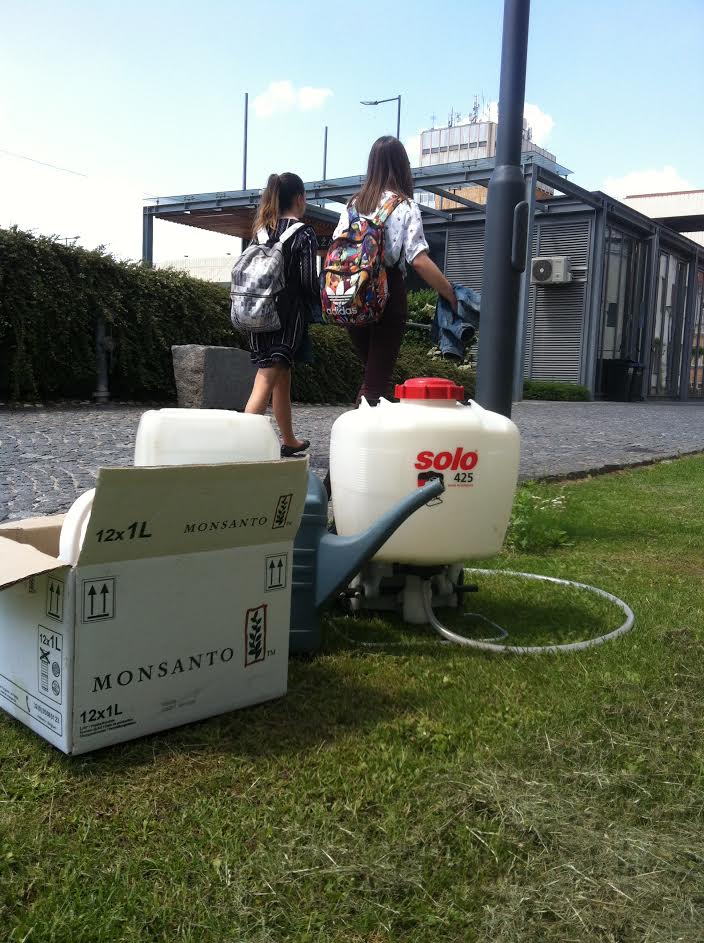
By signing this Pledge, Zagreb has become a member of European Pesticide Free Towns Network, a network of European towns who replaced pesticides with sustainable, non-hazardous alternatives. This Network is established by PAN Europe, together with its member organizations. Pesticide-free towns have teamed up within this Network with the aim of creating a platform for linking and sharing experiences, and effectively supporting cities in transition.
The use of pesticides in public places is considered to be unnecessary. While gardeners in Pesticide Free Towns use mechanical technics such as hand weeding, or machine treatment with hot water or steam, biologists and city leaders are trying to promote the “return of Nature back to the towns”, by convincing people that, for example, plants on the pavements are not “an ugly scene”, and that native wildflowers are as beautiful as those cultivated. With accepting native plants, and by accepting so-called weeds on lawns, we are contributing to biodiversity and to the return of pollinators, besides sparing the animals of direct poisoning.
Pesticides have multiple negative effects:
- Pesticides have a direct impact on human health, and although the effects of pesticide use do not show directly and at the moment of consumption, pesticides certainly have a significant impact on human health. They are carcinogenic, cause non-Hodgkin's lymphoma, affect reproductive health - conceiving problems, cause abdominal pain, obesity, diabetes, allergies, neurological problems, agitation, asthma, Parkinson's disease, and many other diseases and disorders.
- The application of pesticides is never limited to the area for which the pesticide application is intended, but the effects of pesticides are spread far beyond the scope of application. Pesticides spread with air and water after being washed out by irrigation or after rain. Unfortunately, in almost all tested water samples (in Western European countries) residues of pesticides were found.
- Pesticide cause direct harm to animals and insects that inhale or digest pesticides, or eat animals and bugs that are intoxicated by pesticides; this causes the imbalance in nature by killing bugs which are, or predators, or the food for other animals; direct harm applies especially to amphibians and fish which have permeable skin and therefore absorb toxins with their whole body surface. By choosing alternatives to pesticides, the impact on soil, air and water pollution, especially the groundwater that is a source of potable water is eliminated. Animals and plants are not affected by these toxins, and the biodiversity is improved.
In 2018. the Earth Trek association conducted a campaign urging all the cities in the Republic of Croatia to follow the examples of cities in Western Europe countries. Zagreb and Ozalj are those who committed to phasing out pesticides.
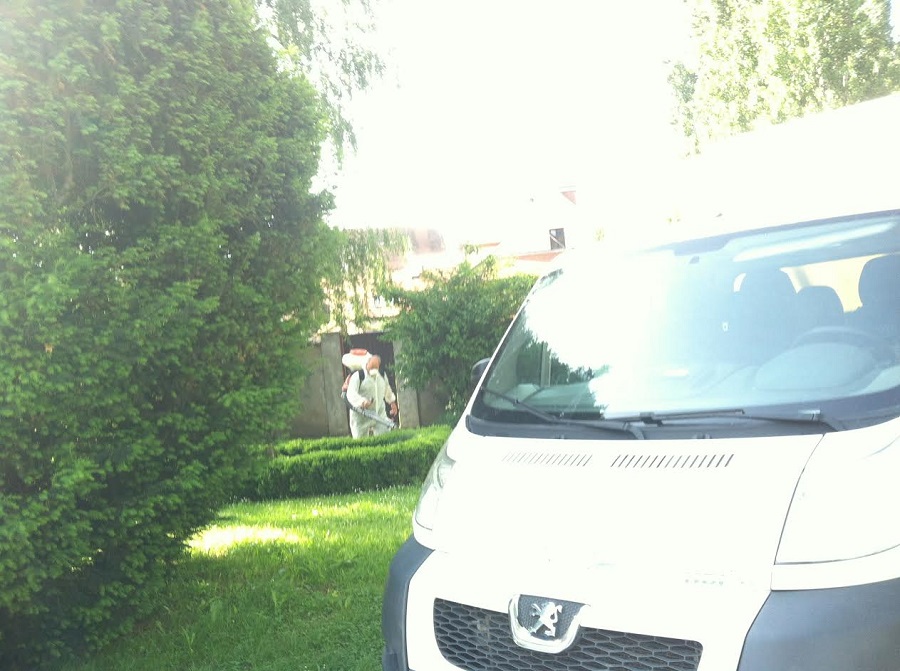
In the Town of Varaždin the use of pesticides is not banned.
Varaždin has beautiful parks and green areas which are probably treated with pesticides. An especially endangered group are children – who run around grass, roll on it and expose themselves directly to pesticides.
Since the use of pesticides is not limited only to the application spot (which was proven by taking the soil samples of children’s playgrounds), children are exposed to dangerous toxins, even if those were not applied in kindergartens, or on the playgrounds. Especially worrying is the fact that most of these toxins are endocrine disruptors and have long-term effects on health.
The town of Varaždin hasn’t responded to our request to sign the Pledge.
We haven’t received the explanation on cancelled meeting in September last year, accusations of writing inaccurate allegations on our web page, nor the promised notification after planning to ask the Town’s Utility Company for an explanation of pictures we took in May 2018.
Earth Trek wishes the best for the citizens of Varaždin. Besides the elimination of toxic substances from public areas, air, soil and ground water, the transition to a pesticide free concept would open new job positions, and would also promote the Town of Varaždin trough Pesticide Free Towns marketing tools.
We believe the health of the citizens should be everyone’s first concern, and even though it seems that the use of pesticides is the cheapest way of green areas maintenance, the externalities show that the costs of the treatment of the illness caused by the use of pesticide cost the society and the government even more.
It takes time for the pesticides to decompose, particularly for those persistent, and it takes time for nature the re-establish its balance – that’s why we need to act immediately and start applying sustainable systems, in order to leave a healthy world to our children.
For more information about Earth Trek in Croatia, visit the official website.
GreenerSites Project Concludes in Rijeka
ZAGREB, July 3, 2019 - A closing conference for a transnational project called "GreenerSites - Rehabilitation of Brownfield Sites in Central Europe", was held in the northern Adriatic city of Rijeka on Wednesday.
The 3.8 million euro project was launched in 2016 to improve the environmental management of unused or underused industrial areas. Apart from Rijeka and the city's port authority, it involved nine partner institutions from Italy, Slovenia, Poland and Germany.
Eighty-five percent of the money came from the Central Europe transnational cooperation programme 2014-2020, which promotes cooperation among EU member states in Central Europe, while the rest was provided by local partners.
The aim of the project was to improve the environmental management of unused or underused industrial areas by defining strategies and tools based on a sustainable and integrated approach in order to make functional urban areas (FUAs) cleaner, healthier and more liveable.
The focus was on developing a common geo-information tool for brownfield regeneration, strategic action plans and 11 pilot actions testing new and sustainable technical solutions to improve the environmental performance of brownfields. Workshops for public-sector employees and stakeholders were also held.
In Rijeka, the project covered the unused area of the former oil refinery at Mlaka which is now co-owned by the City of Rijeka, the Port Authority and the INA oil company.
More Rijeka news can be found in the Lifestyle section.
Feeling the Heat? Check Your Croatian Destination Temperature 1969-2049
June 12, 2019 - As temperatures soar in Croatia and that wet May is all but forgotten, a look at how the number of hot days are increasing over time in various Croatian destinations - and how much hotter things could become.
I predict that fat pink Brits like me will be extinct as a species if this carries on. The summer heat is already becoming unbearable for someone born in the rain in Manchester. It didn't used to feel this way, and the onset of the summer heat appears a lot more sudden than it did when I first moved to Croatia back in 2002.
And the statistics seem to not only bear out that change, but predict that much more is to come. Great news if you like it hot (I guess), but not so great for pink Englishmen.
The New York Times came out with a fascinating tool last summer, where you could see how much hotter your hometown has become since you were born. And, worryingly, how much hotter is will become in the future. The analysis was conducted for The New York Times by the Climate Impact Lab, a group of climate change scientists, economists and data analysts from the Rhodium Group, the University of Chicago, Rutgers University and the University of California, Berkeley.
It should be borne in mind that the rise in temperatures could easily be higher - the future predictions are based on countries curbing emissions roughly in line with the Paris Agreement pledges.
The tool focuses on one topic - how many days of 32 C does your hometown have - in the year of your birth, today, and in the future.
I started with Manchester, but that did not register (I guess you need to have some sun to qualify) and then I had a look at various destinations around Croatia, starting 50 years ago.
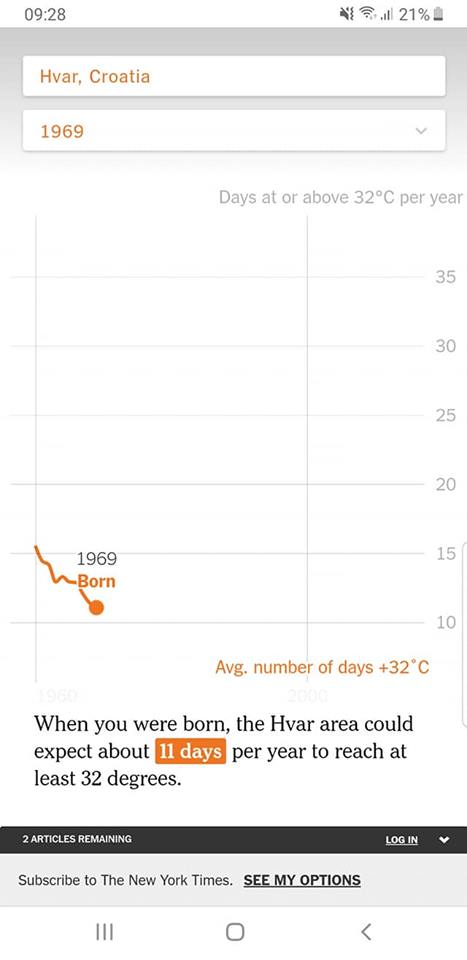
Where better to start than the sunshine island, which had 11 days a year of 32C temperatures back in 1969.
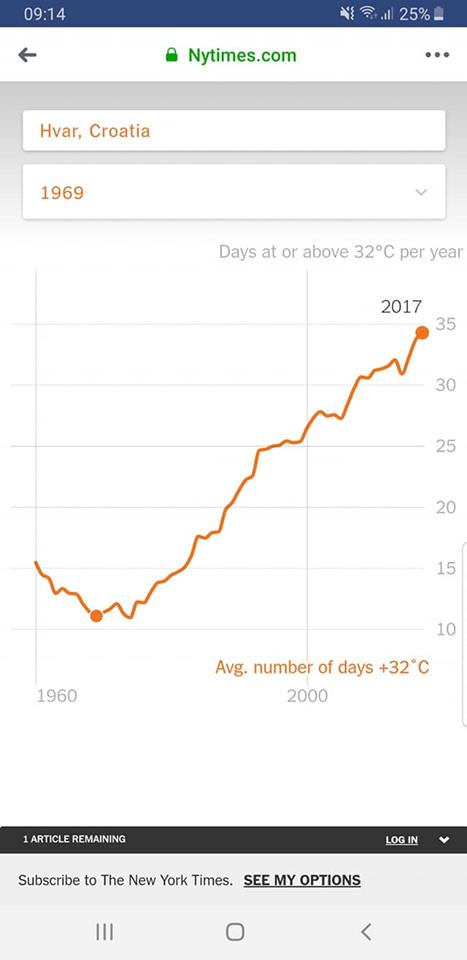
Compared to 34 today.
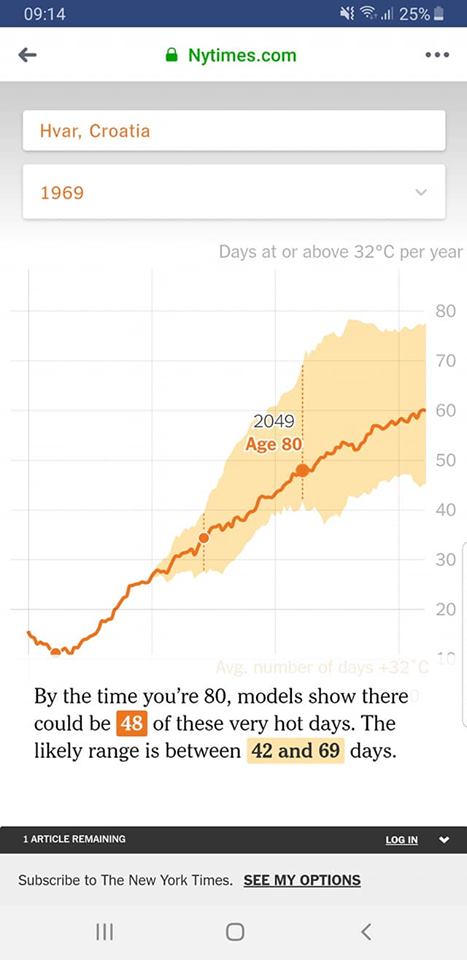
And quite a few more in the years ahead.
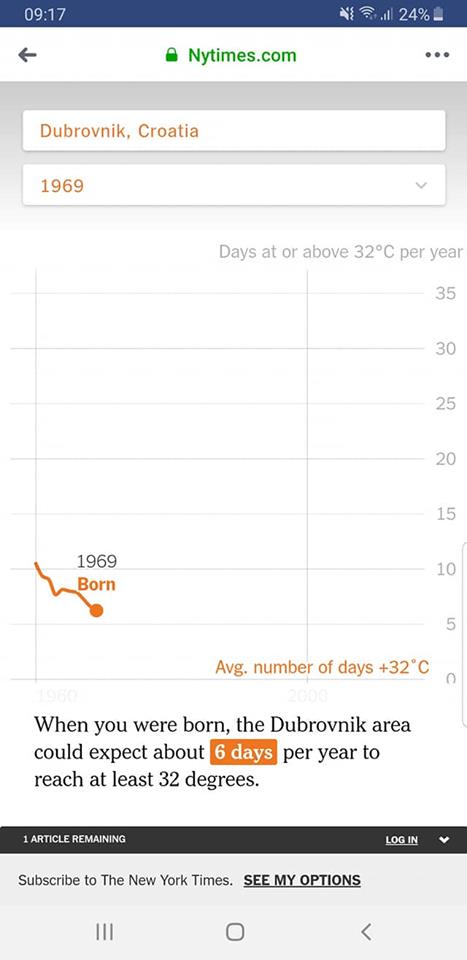
Dubrovnik was not quite as hot as Hvar 50 years ago.
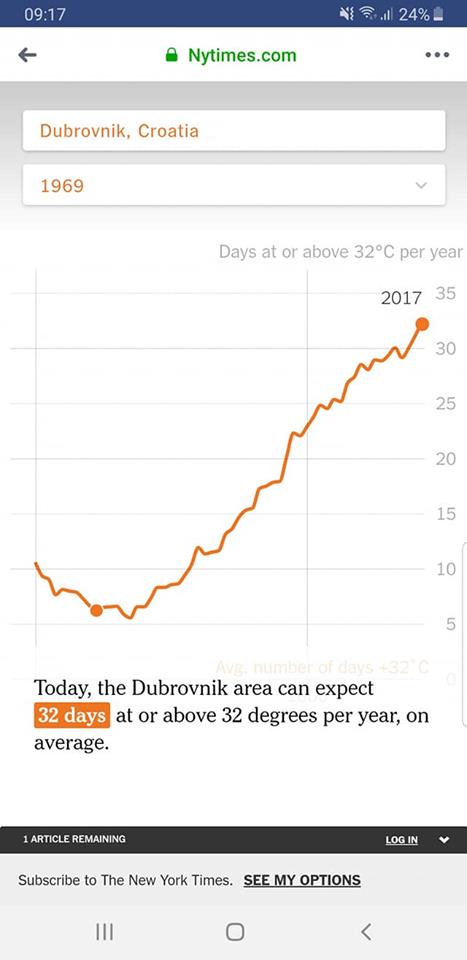
But it is catching up.
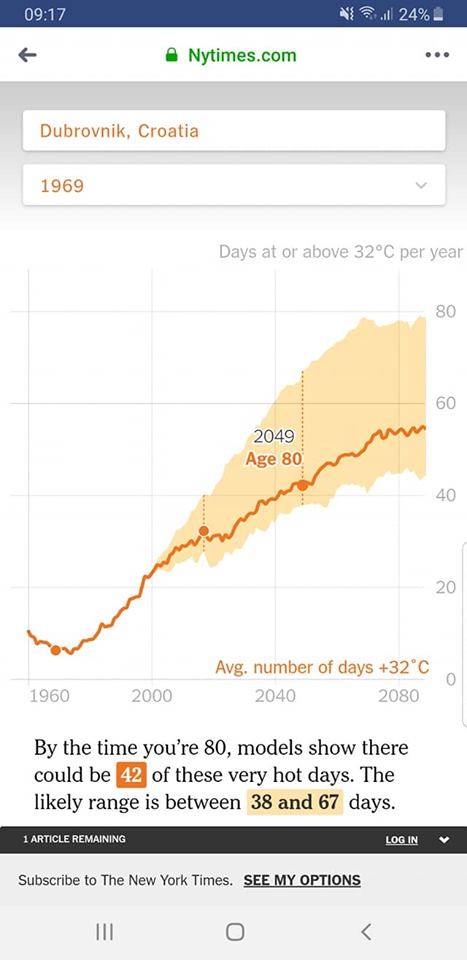
And many hot days on the beach await.
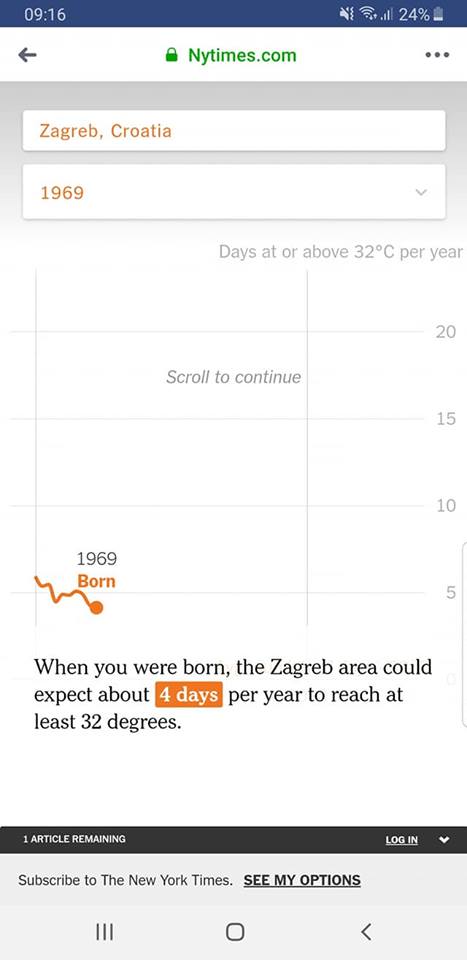
Things are also hotting up in the Croatia capital.
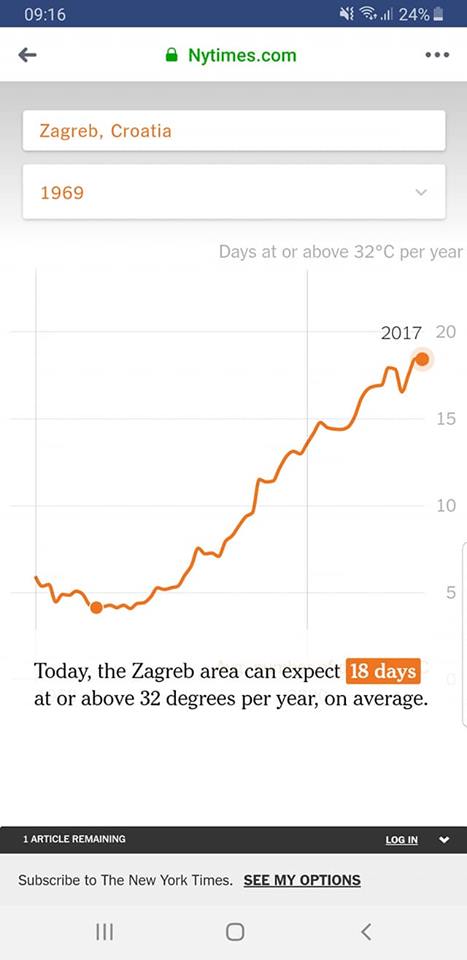
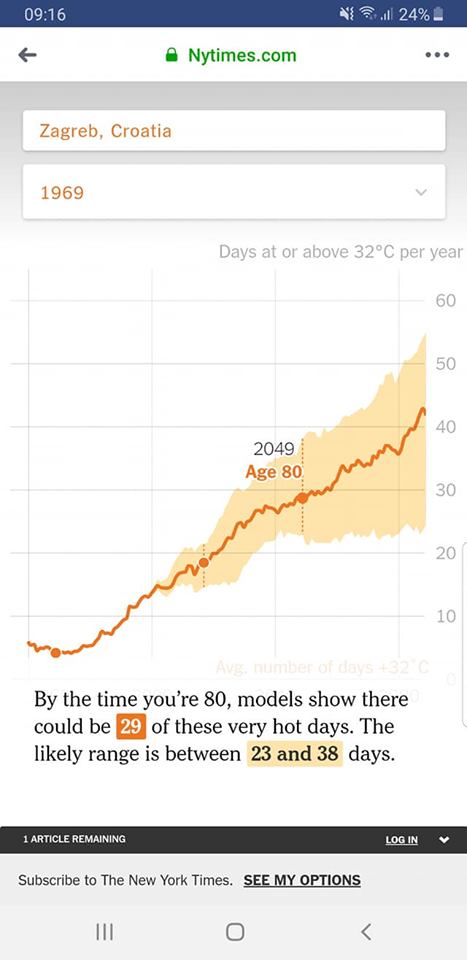
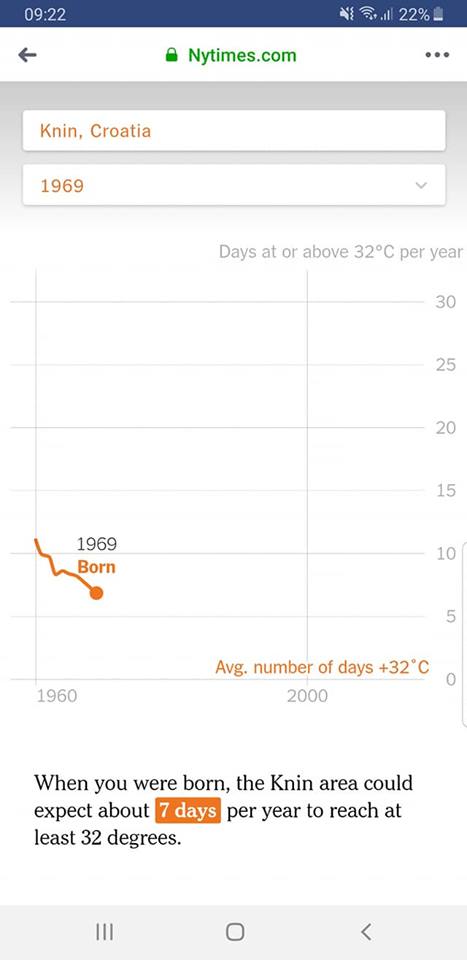
I think the hottest place I have ever been in Croatia was Knin in August.
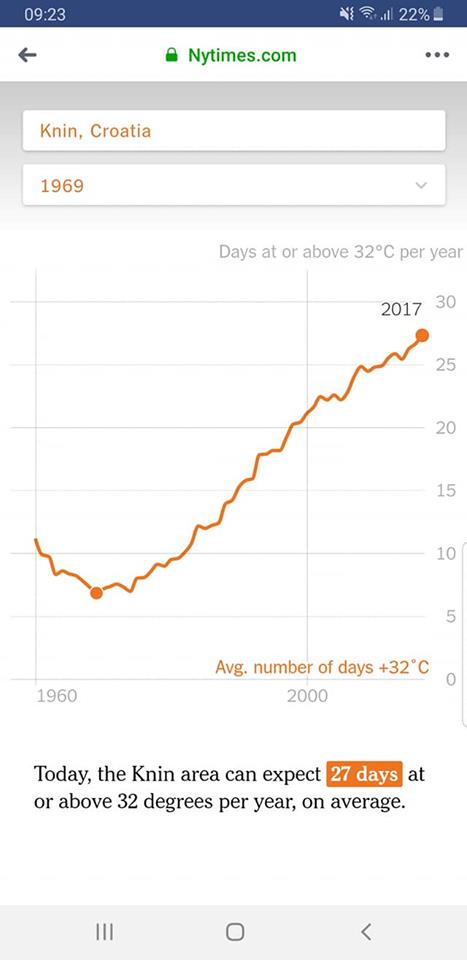
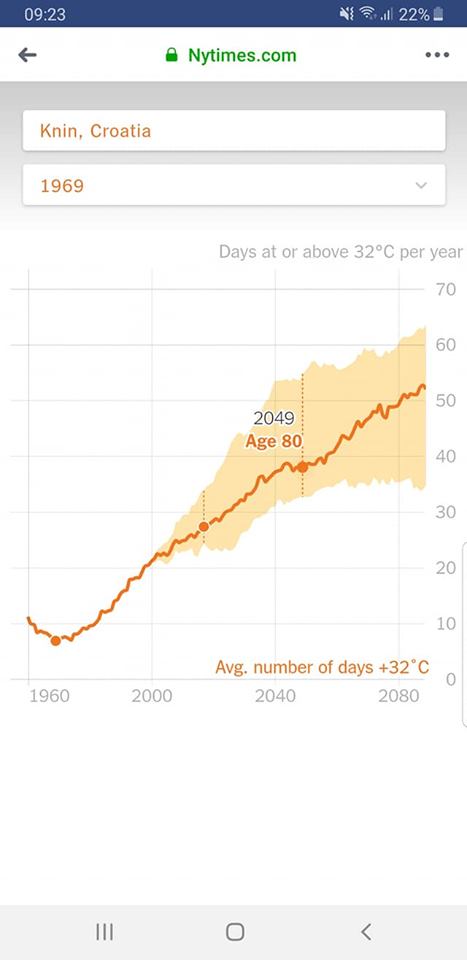
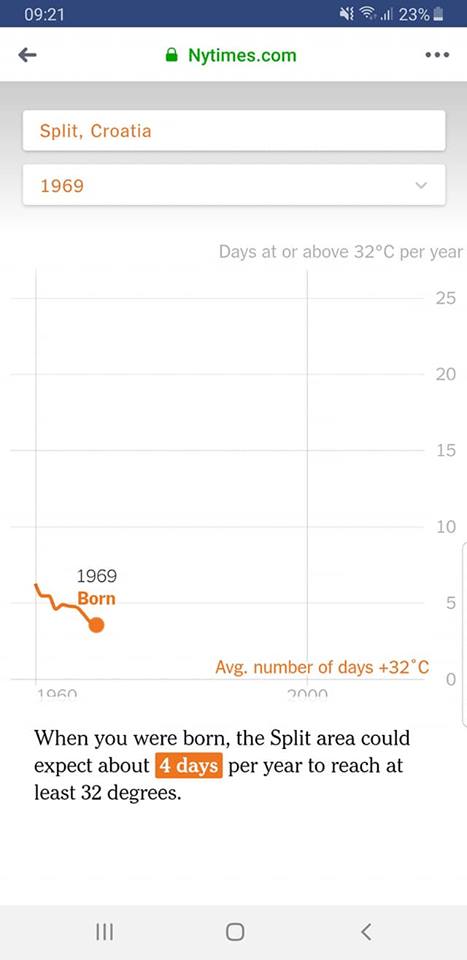
And this is how things have changed and are projected to change in Split.
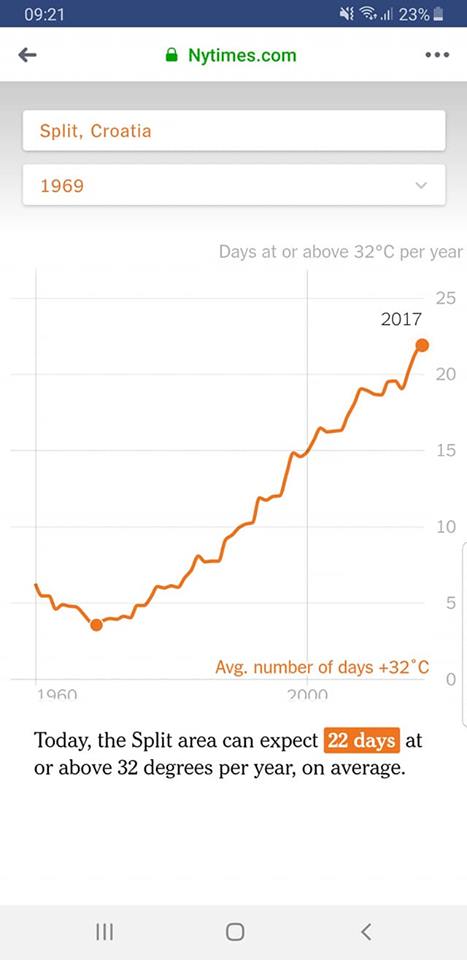
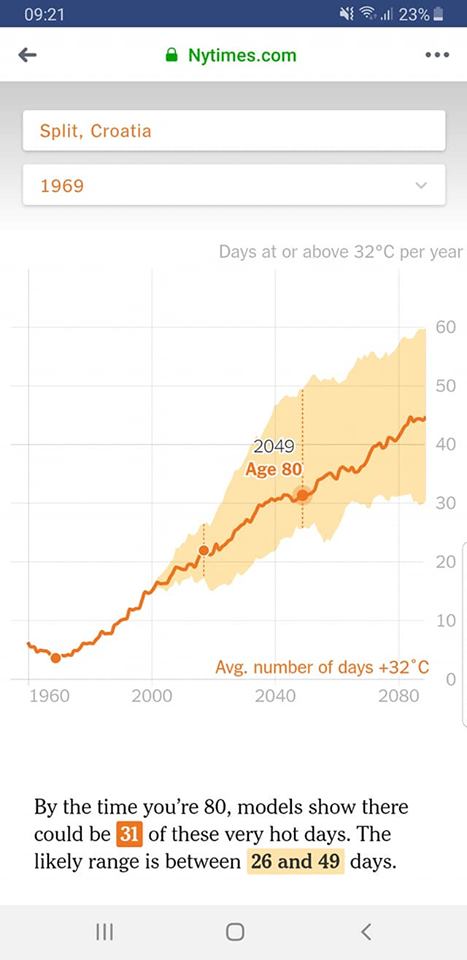
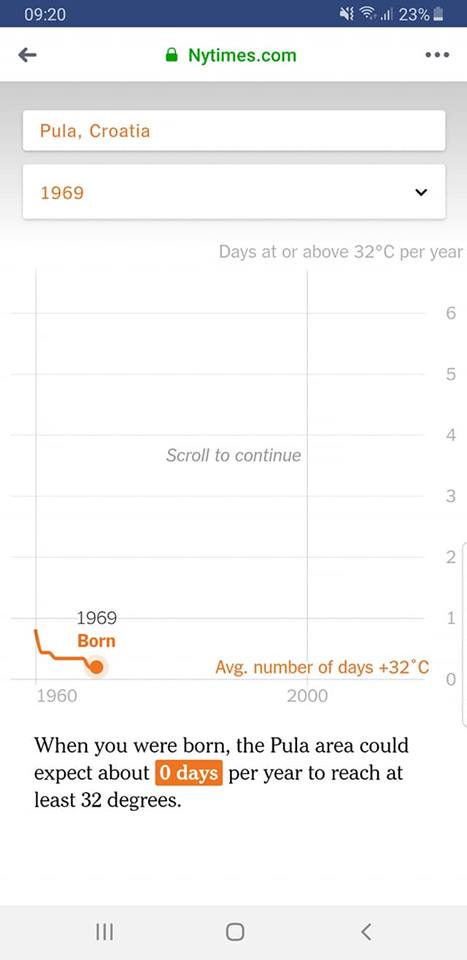
In love with Croatia and planning to buy a home, but prefer cooler temperatures by the coast? You may want to take a closer look at Pula.
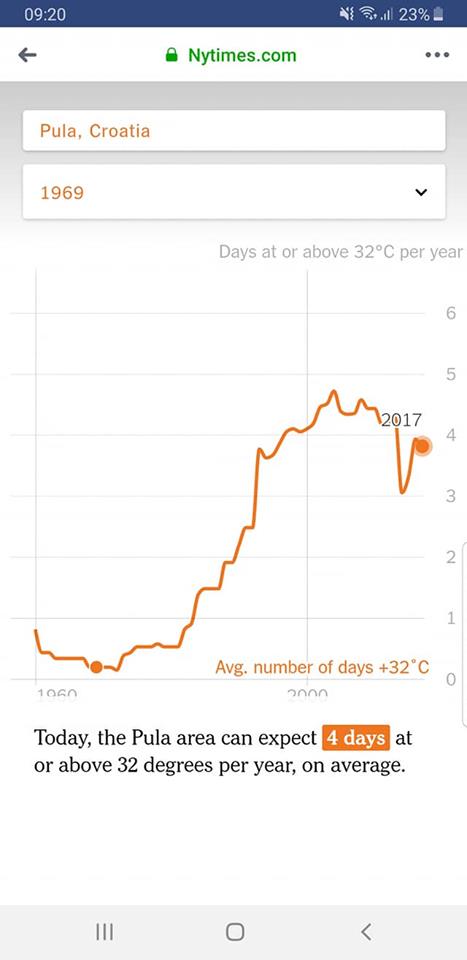
Istria's largest city didn't even have days at 32C half a century ago, and they are still quite rare these days.
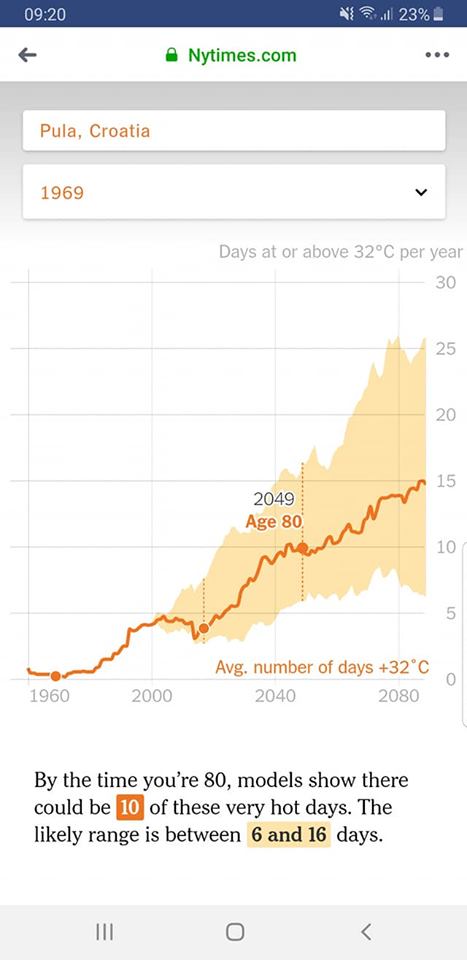
And although they are set to increase, the rise is not predicted to be as dramatic elsewhere.
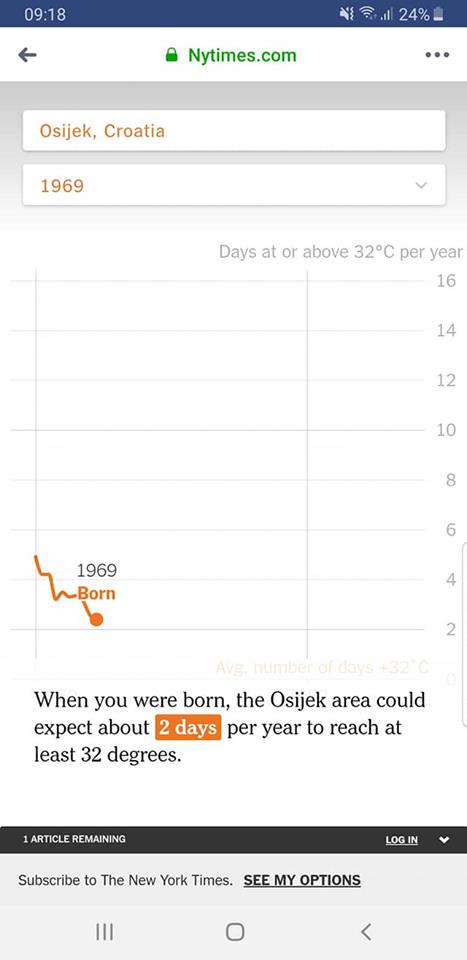
Another city away from the coast which not traditionally swelteringly hot is Osijek, which lies on the Danube.
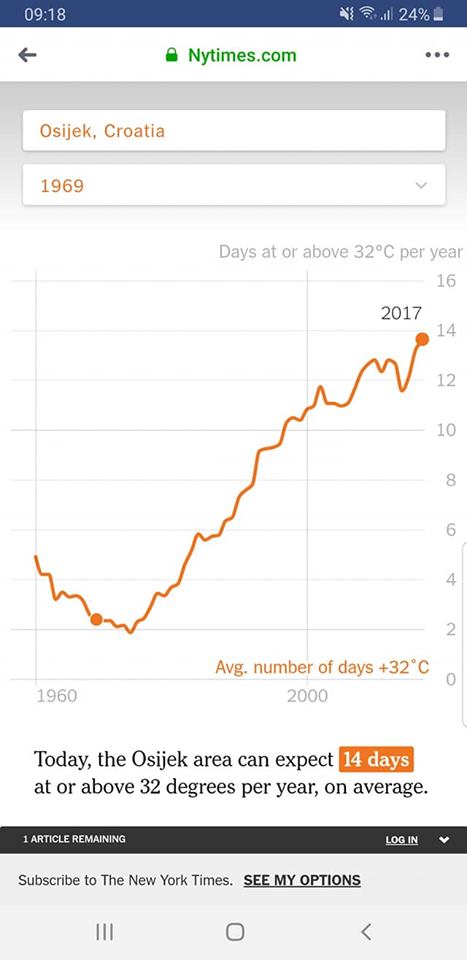
As elsewhere in Croatia, things have changed, however.
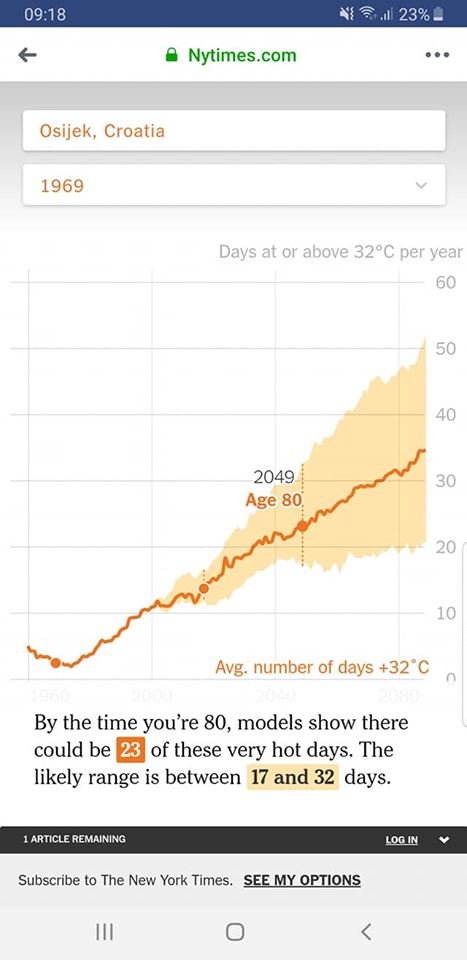
And the future is looking a lot hotter than in Pula.
All these Croatian temperatures pale into insignificance, however, when compared to the hottest place I have ever lived in and worked - Bosasso, the capital of the breakaway autonomous republic of Puntland in eastern Somalia - heartland of those infamous Somali pirates.
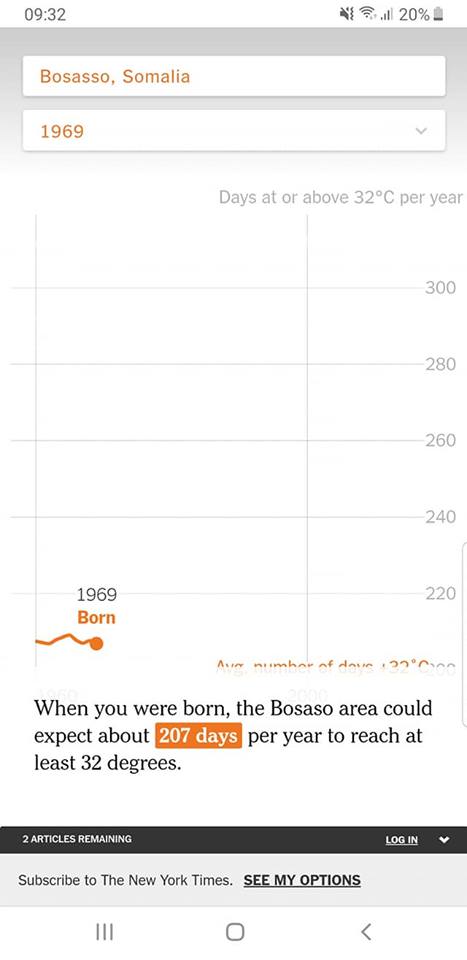
I think if I had been born there, I would have been able to withstand the heat a lot more.
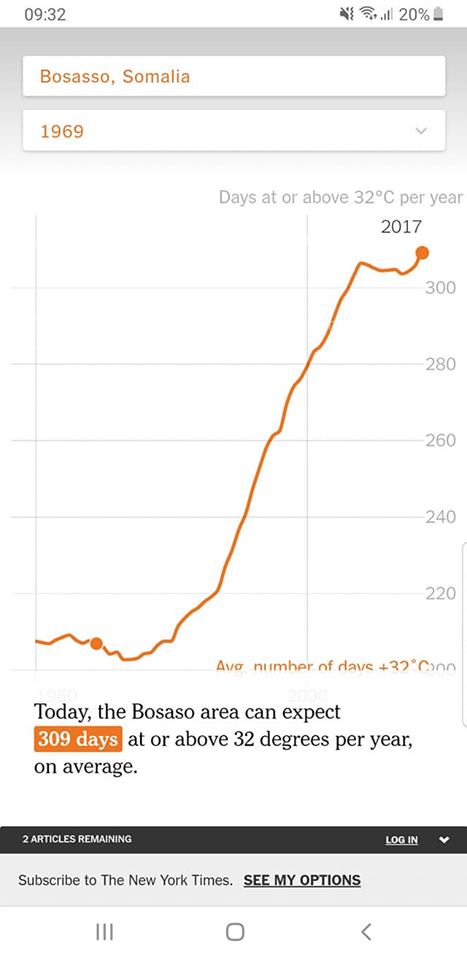
And you can perhaps understand how some Africans have real trouble dealing with the cold.
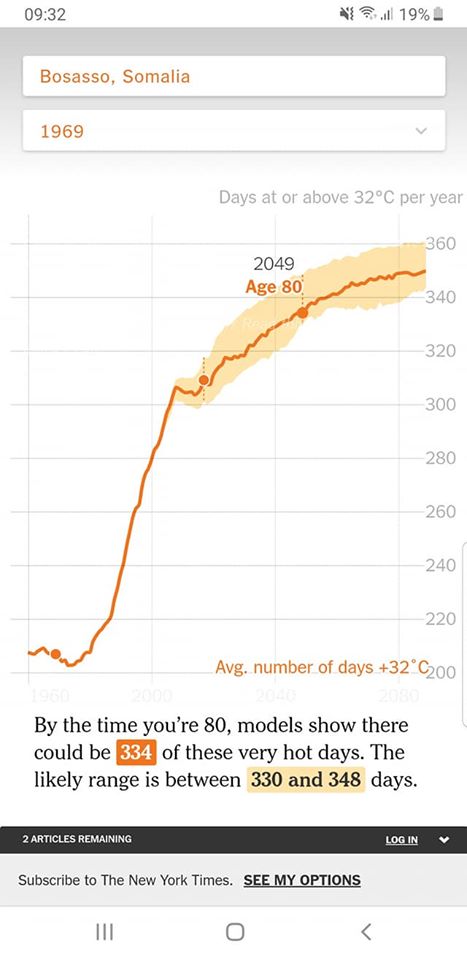
I wonder if there are already any places on the planet where it is already 32C every day of the year.
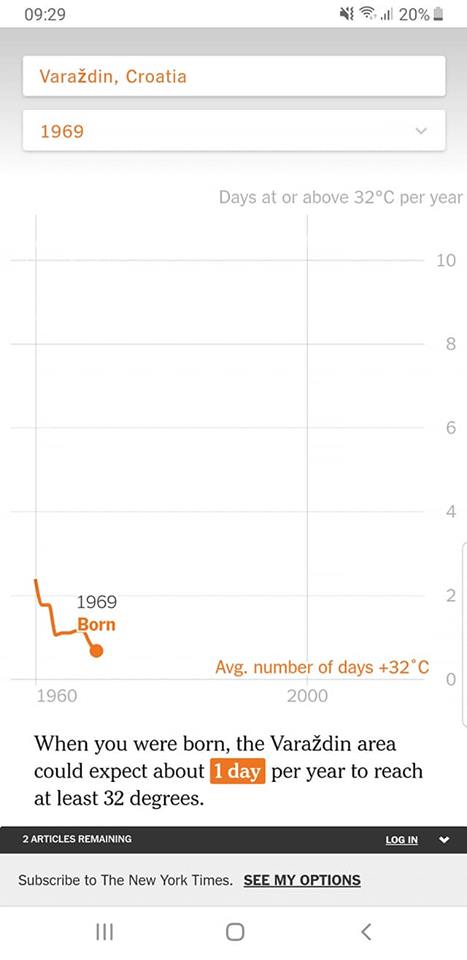
Looking at the data, there seems to be some method in my decision to move from the warmth of Hvar to the cooler climes of Varazdin.
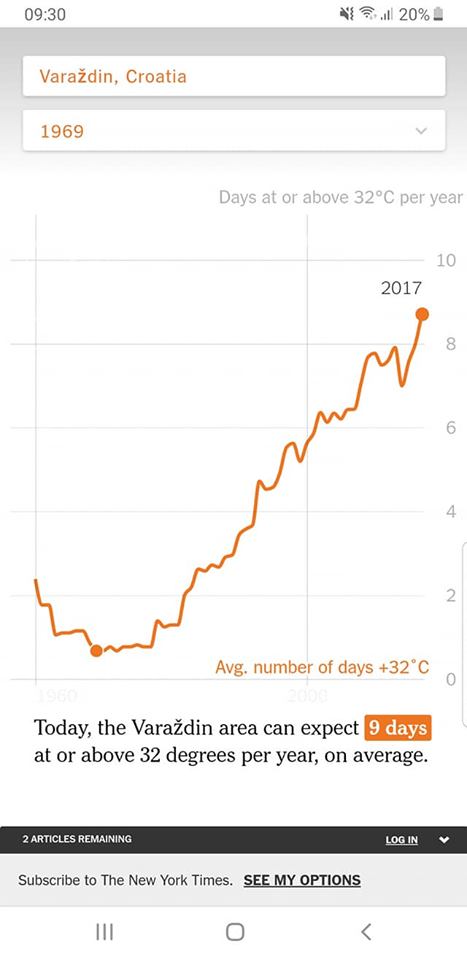
As with Pula, the very hot days are still relatively rare.
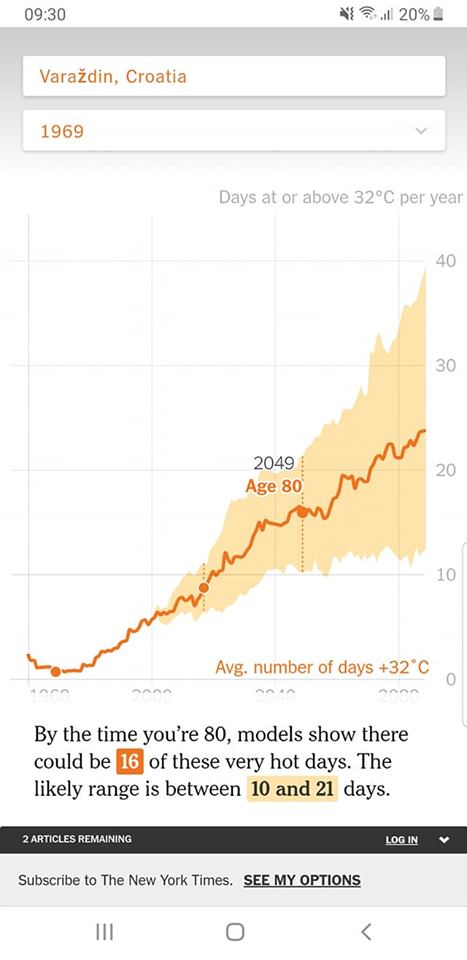
And, just to stress again according to the experts, these numbers are only if the emission curbs of the Paris Agreement are met.
There is nothing like seeing a global problem in a local environment to put things in perspective - a really important and useful tool from The New York Times. Check out your hometown or destination here.
Šibenik-Knin County Wins ''Mediterranean Climate Change Adaption'' Award
As Morski writes on the 31st of May, 2019, the fourth European Conference on Climate Change Adaptation was held in Portugal (Lisbon) from the 28th to the 31st of May this year, and Dr. Sanja Slavica Matešić, head of the Department of Environmental Protection and Communal Activities Šibenik-Knin County in Dalmatia partook.
A conference of this kind is held every other year, and this year's event was held under the slogan "Working together to prepare for change". The aim of the conference is to provide a dialogue between the various stakeholders of the academic community, the government and the economy on multiple aspects of adaptation to climate change.
It includes the promotion of communication and the exchange of knowledge between researchers, policy makers and professionals, as well as presenting integrated solutions and encouraging new activities, supporting ongoing efforts to increase coherence and synergy between disaster risk research and policy and practice, as well as discussing key challenges and solutions in cities.
The conference also presented its awards for Mediterranean adaptation to climate change. Šibenik-Knin County received the "Mediterranean Climate Change Adaptation Award" for its outstanding contribution to the area of adaptation to climate change, more specifically because of its integrated coastal zone management plan in Šibenik-Knin County, which places a special emphasis on climate change and variability.
Dr. sc. Sanja Slavica Matešić was handed Šibenik-Knin's award for its hard work and dedication to understanding and properly emphasising the threat of climate change. 28 candidates from 9 countries participated in the competition for the main prize, and in addition to Šibenik-Knin, counties in Portugal, Morocco, Jordan, Palestine and Lebanon presented their own respective projects.
The integrated coastal zone management plan of Šibenik-Knin County was presented by Ph.D. Sanja Slavica Matešić and Daria Povh Škugor.
Within the conference, special awards were awarded in three categories: "Development, Infrastructure and Construction", "Ecosystem and Natural Resources" and "Methods for Design and Public Policy". Šibenik-Knin County is also the winner of the "Methods for Design and Public Policy" award.
The aforementioned coastal plan is a type of new generation plan that only a few throughout the Mediterranean can boast of, and it's also the very first of its kind in the Republic of Croatia, bringing extra praise for Šibenik-Knin County.
Stay up to date by following our dedicated lifestyle page. If you're interested in seeing how Croatia protects its environment, give Total Eco Croatia a follow.
Agreements Expected to Bring Slavonski Brod Cleaner Air Signed
ZAGREB, May 26, 2019 - The people of Slavonski Brod should be a step closer to clean air and a solution to the pollution caused by the oil refinery in Bosanski Brod across the Sava river in Bosnia and Herzegovina after agreements on the supply of the refinery with gas were signed in the Croatian city by the refinery, its owner, Russia's Zarubezhneft, Crodux Gas and Croatia's Plinacro gas transport operator. The signing ceremony was attended by President Kolinda Grabar-Kitarović.
The agreements envisage the repurposing of a gas pipeline whereby Crodux Gas will supply the refinery with gas for the next ten years, Crodux Energy director Branko Radošević said, adding that this Croatian company would invest HRK 24.5 million in the pipeline.
The refinery will be supplied by gas by connecting to Croatia's gas transport system by repurposing the 5.5-kilometre-long Slobodnica-Brod pipeline into a direct pipeline.
Radošević said the refinery would repay Crodux Gas the costs of the capital investment in the direct pipeline during the duration of the agreements, adding that the pipeline should be put to use in a year's time.
Zarubezhneft general director Sergey Kudryashov said he did not believe two years ago that this project would be realised.
But we have shown that we can work together, work fast, reach compromises, he said, adding that the project would help to improve the ecological situation around the refinery. He said the refinery was being overhauled since the end of March and that production was expected to resume next year after it was connected to gas supply.
President Grabar-Kitarović said the Bosanski Brod refinery was not the only problem but that it was the biggest air polluter in the Posavina region.
She recalled that she had discussed finding a solution a number of times with Russian officials and with those in Croatia who were interested. She thanked Russian President Vladimir Putin, saying he recognised the value of the project and stood firmly behind it. She also thanked "everyone" in the Slavonski Brod area for raising the issue of air quality and fighting for dignified living.
Asked by the press how much air pollution in Slavonski Brod would be reduced after the refinery began operating on gas, Kudryashov said the refinery would fully comply with EU regulations.
Reporters also asked what the benefit for Croatia was if the agreement stipulated that the refinery would be entitled to buy the direct pipeline, to which Radošević replied that Crodux Gas was the investor and owner of the pipeline on Croatian territory.
Kudryashov said two payments were envisaged, under a tariff enabling a refund on investments in the pipeline and under a tariff for the gas to be transported. The first tariff will stop being paid after ten years, after which payments will be made under the second tariff, he added.
The signing of the agreements was the result of talks begun in Slavonski Brod after an explosion in the refinery last October. They were initiated by President Grabar-Kitarović, who met in the Croatian city with representatives of the Russian Economic Development Ministry and Zarubezhneft. Also present was Croatian Environment Protection and Energy Minister Tomislav Ćorić and representatives of Plinacro and Crodux.
More news about Slavonski Brod can be found in the Lifestyle section.
Recycling of Plastic Products a Priority for Croatia
ZAGREB, May 21, 2019 - Addressing a conference on plastic as a challenge of the circular economy, Croatian Environment and Energy Minister Tomislav Ćorić said on Tuesday that the recycling of plastic and other materials was a priority while the head of the Croatian Greenpeace office, Zoran Tomić, said that the country's presidency of the EU in 2020 provided an opportunity "to show leadership in that area as well."
Twenty percent of Croatia's GDP is generated by tourism and the country can beat its rivals only with a healthy and clean environment, Ćorić said, recalling that more than 37% of Croatia's land territory was covered by the NATURA 2000 programme.
"That is why all types of recycling, not only of plastic... but other materials as well, are a priority and must be a priority in the period to come," Ćorić said at the conference, organised by the Croatian Waste Management Association (HUGO), a member of the International Solid Waste Association.
Ćorić said that by entering the EU Croatia had assumed the obligation to start collecting separately 50% of paper, glass, metal and plastic waste by the end of 2020, that is, 60% of such waste by the end of 2022.
The Environment and Energy Ministry is fully committed to that goal, but achieving it depends on the behaviour of all social stakeholders, notably local government units and citizens, said Ćorić.
He recalled that every year Europe generated around 25 million tonnes of plastic waste, of which only 30% was collected while the rest stayed in the environment.
"We have to deal with that problem successfully in the future," he stressed, adding that his ministry fully supported the EU's policy of not using plastic in situations where it was not necessary.
"Croatia and its Environment and Energy Ministry support the goal of building into new products a minimum 10 million tonnes of recycled plastic by 2025, making all plastic packaging in the EU reusable and recyclable by 2030 and making the recycling rate exceed 50% as well as increasing the EU's sorting and recycling capacity four times compared to the current capacity," Ćorić said.
As for the EU directive on reducing the impact of certain plastic products on the environment and the plan to ban certain plastic products such as single-use plastic cutlery, cotton buds and straws, Ćorić said that long-term effects would definitely be positive.
He said that his ministry was working intensively with the Croatian Chamber of Commerce on modernising the secondary raw material market and defining technological requirements for individual types of waste to facilitate its sale and that work was underway on amendments concerning packaging waste in order to improve system efficiency.
The head of the Greenpeace office in Croatia, Zoran Tomić, underlined the importance of protecting the Adriatic from plastic waste.
Commenting on the charging of a fee on plastic bags in Croatia, he said that rules on collecting the fee were largely not observed, that there was no set price and that the thickness of bags was also a problem because the lightest bags were exempt from the fee.
"By introducing the mandatory fee in 2002 Ireland has managed to reduce the use of light plastic bags by 90%," he said, adding that Greenpeace activists believed that with the current rules in force, Croatia would not be able to achieve the goal of reducing the use of plastic bags by the end of the year, which was why they had launched a petition to ban light plastic bags which had been signed by more than 40,000 people so far.
More news about environmental protection can be found in the Lifestyle section.
Greenpeace Puts Linen Bags on Monuments in Protest Against Use of Plastic Bags
ZAGREB, May 17, 2019 - Greenpeace activists have put linen bags on monuments throughout Croatia bearing messages about the excessive use of plastic in packaging to encourage consumers to use less plastic and support a petition against the use of plastic bags, which has been signed by more than 40,000 people over the past two and a half months, Greenpeace reported on Friday.
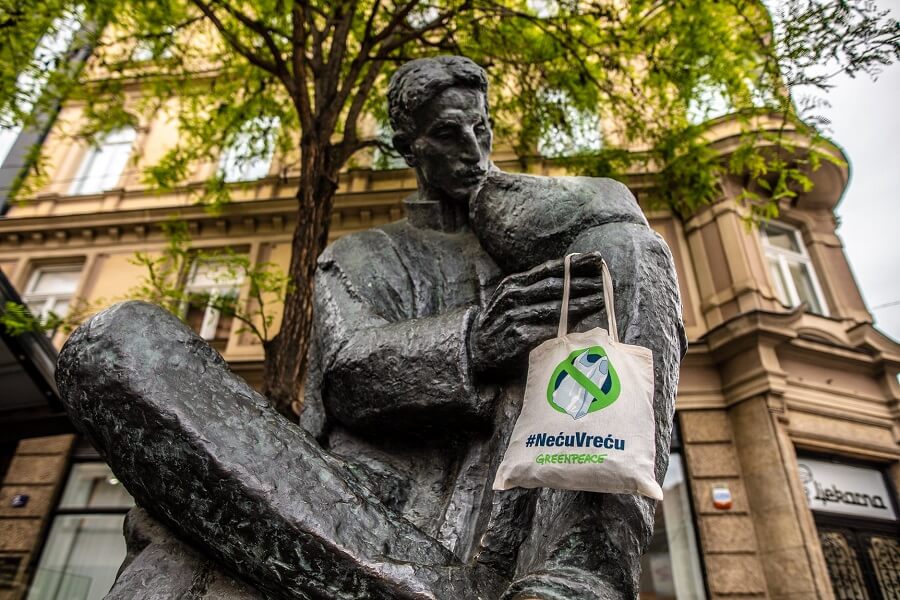
A compulsory fee for plastic bags has been in force in Croatia since January, with the exception of very light bags, which have to be marked "Use plastic sparingly."
Activists warn that due to their poor quality, plastic bags are used only briefly and due to their low price, they are used uncontrollably, which causes damage to the environment. They believe that Croatia will not manage to fulfil the EU directive on plastic bags specifying that the maximum consumption of light plastic bags should curbed to no more than 90 light bags per person per year by 2020, or 40 per person by the end of 2025.
By hanging linen bags on monuments, the activists want to warn that Croatians consume about 200 plastic bags per capita annually, or 830 million plastic bags in total. That amount of plastic could wrap the Earth nine times, they warn.
More news about environmental protection can be found in the Lifestyle section.


